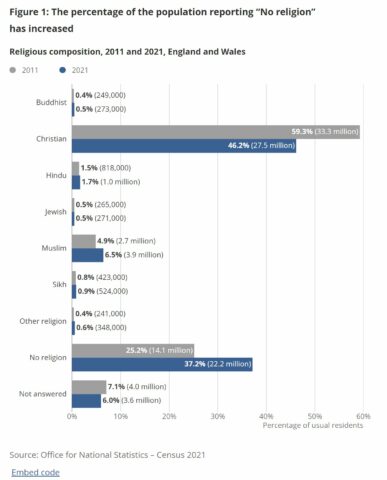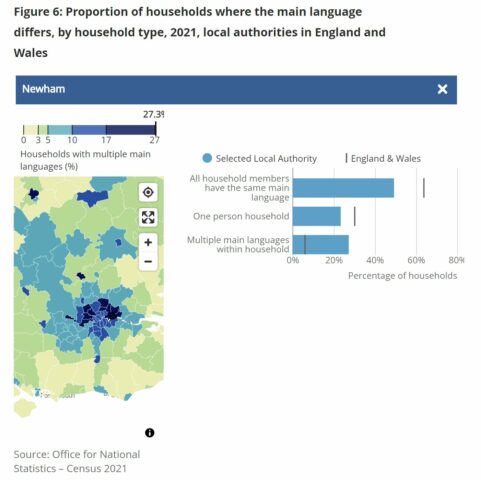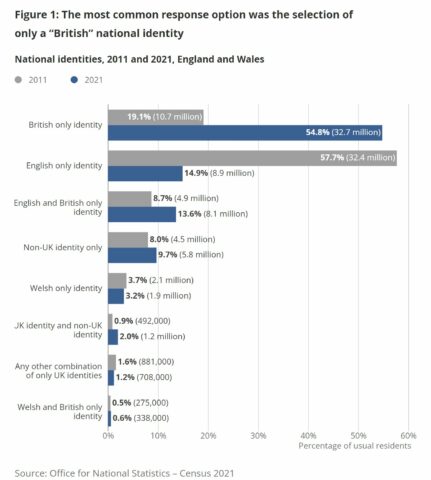Figures released by the Office for National Statistics (ONS) today have revealed that Christians are now a minority in England and Wales for the first time.
Christians now make up less than half of the UK population for the first time in census history, with the proportion of the British population who class themselves as Christians dropping to 46.2 percent (27.5 million people) in 2021, representing a drop of 5.5 million in the number of Christians in the last ten years. Christians are now outnumbered by non-religious people in Wales.
The once-in-a-decade snapshot of the UK has included a voluntary question about religion since 2001. In 2011, returns across the UK also documented a sharp fall in those ticking Christianity – with 59.3 per cent describing themselves as Christians, falling from 71.6 per cent a decade earlier.
The new government figures record a 3.1 percentage point decrease from 59.3 per cent (33.3 million people) identifying as ‘Christian’ in 2011. Despite this, however, “Christian” remained the most common response to the religion question.
The government data also pointed to a surge in those professing to have no religion – with ‘no religion’ the second most common response in the census, increasing to 37.2 per cent (22.2 million) from 25.2 percent (14.1 million) in 2011 – jumping by over 8 million.
This marks the continuation of a trend recorded between 2001 and 2011, when the number of people reporting ‘no religion’ had risen from 14.8 per cent (7.7 million people).
A particular increase in the non-religious occurred in Wales, where 47% ticked ‘No religion’, compared to 44% ‘Christian’. London was the most religious city, while the least religious places were all in Wales – specifically in Caerphilly, Blaenau Gwent, and Rhondda Cynon Taf. In England, Brighton and Hove, Bristol and Norwich were the least religious places, with all six recording a majority ‘no religion’.
London remains the most religiously diverse part of the UK, with 25.3 per cent of all usual residents reported to have a religion other than ‘Christian’.
The figures also show that every other major religion — excluding Christianity – increased over the last decade.
Significantly, while Christianity fell, the number of people following Islam rose by 44.4 per cent in the ten-year period. The Islamic population now makes up 6.5 per cent of England and Wales, according to the census.
The Sikh population also grew – up from 0.8 per cent (423,000) to 0.9 per cent (524,000), and the number of Buddhists also rose by a percentage point from 0.4 per cent (249,000) to 0.5 per cent (273,000).
The number of people describing themselves as “Hindu” also rose to 1 million, (1.7%) in 2021, up from 818,000, (1.5%) in 2011. Meanwhile, the Jewish population rose from 265,000 to 271,000 (both at 0.5 per cent).
Other results from the census show a decrease in the number of those who are white. 81.7 per cent (48.7 million) usual residents in England and Wales identified their ethnic group in the ‘white’ category – which marks a decrease from 86.0 per cent (48.2 million) in the 2011 census.
In addition, Leicester and Birmingham became the first UK cities to have “minority majorities”. The most foreign speaking constituency was Newham where 27.3% of people speak a different main language.
The most common ethnic group other than white was ‘Asian, Asian British or Asian Welsh’, accounting for 9.3 per cent (5.5 million) of the overall population.
This ethnic group saw the greatest increase from ten years ago – up from 7.5 per cent (4.2 million people) in 2011.
The most common main languages other than English were recorded as Polish (1.1 per cent, 612,000 people), followed by Romanian (0.8 per cent, 472,000 people). Following this, Panjabi (0.5 per cent, 291,000 people) and Urdu (0.5 per cent, 270,000 people) were the most commonly spoken languages.
This ethnic group saw the largest increase from 2011, up from 7.5 per cent (4.2 million people).
Commenting on the findings, Humanists UK said they proved that Britain is now “one of the least religious countries on earth”.
Chief Executive Andrew Copson said:
‘These results confirm that the biggest demographic change in England and Wales of the last ten years has been the dramatic growth of the non-religious. They mean the UK is almost certainly one of the least religious countries on Earth”.
However, the Archbishop of York, the Most Rev Stephen Cottrell, is among those who argue that Christianity still plays a huge role in UK society, despite its evident decline.
The Archbishop says Christianity remains “the largest movement on Earth” but admitted the census findings come as no great surprise:
“It’s not a great surprise that the census shows fewer people in this country identifying as Christian than in the past, but it still throws down a challenge to us not only to trust that God will build his kingdom on Earth, but also to play our part in making Christ known.
“We have left behind the era when many people almost automatically identified as Christian, but other surveys consistently show how the same people still seek spiritual truth and wisdom and a set of values to live by.”
He said that many will still rely on Christian Churches for help this winter, as the cost-of-living crisis continues to present huge challenges for families.
“This winter – perhaps more so than for a long time – people right across the country, some in desperate need, will be turning to their local church, not only for spiritual hope but practical help,” he said.
He added that the Church will be there for them – “in many cases, providing food and warmth”.
“And at Christmas millions of people will still come to our services,” the Archbishop added.


